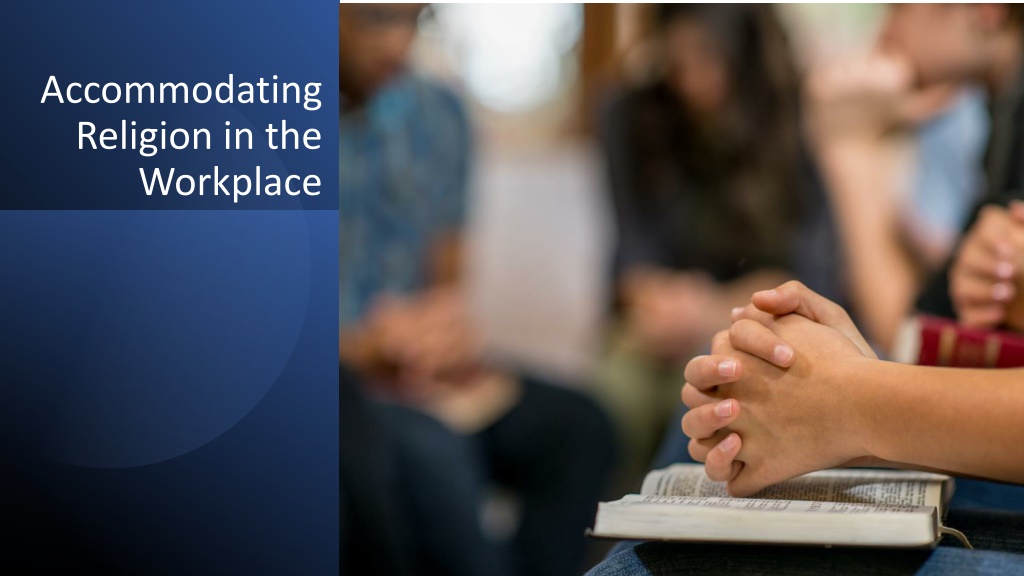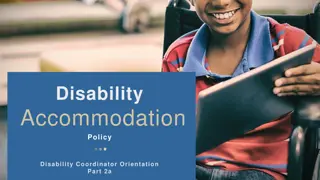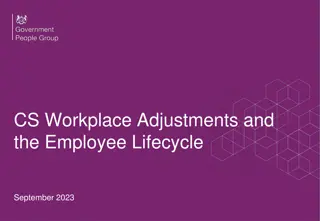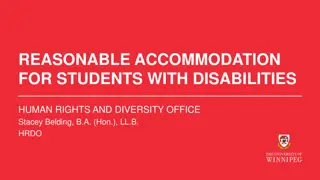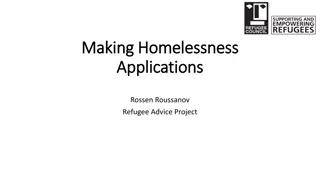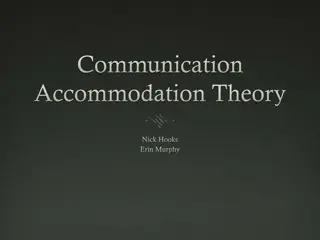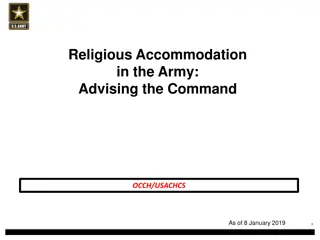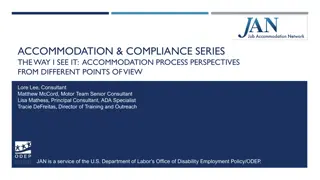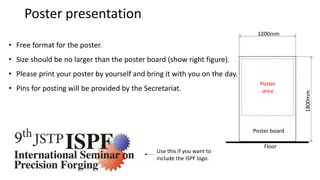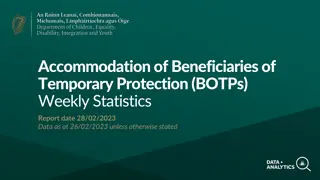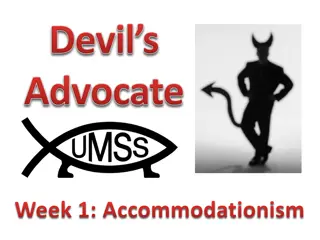Understanding Religious Accommodation in the Workplace
Title VII of the Civil Rights Act of 1964 mandates employers to reasonably accommodate employees' religious beliefs unless it imposes undue hardship. This includes adjustments to the work environment to allow the practice of beliefs. The law also prohibits discrimination and harassment based on religion. Employers must assess accommodation requests to determine undue hardship, considering factors like cost and impact on workplace safety and efficiency.
Download Presentation

Please find below an Image/Link to download the presentation.
The content on the website is provided AS IS for your information and personal use only. It may not be sold, licensed, or shared on other websites without obtaining consent from the author. Download presentation by click this link. If you encounter any issues during the download, it is possible that the publisher has removed the file from their server.
E N D
Presentation Transcript
Accommodating Religion in the Workplace
Accommodating Religion in the Workplace WELCOME! 2
Introduction Under Title VII of the Civil Rights Act of 1964, employers must reasonably accommodate the sincerely held religious beliefs or practices of applicants and employees unless doing so would impose an undue hardship on the employer. Title VII also prohibits discrimination and harassment based on religion. A religious accommodation is any adjustment to the work environment that allows employees to practice their religion or sincerely held ethical or moral beliefs. 3
Agenda Title VII of the Civil Rights Act of 1964 Undue hardship Types of religious accommodations Accommodation examples Requests for religious accommodation 4
Title VII of the Civil Rights Act Title VII of the Civil Rights Act of 1964 defines religion to include "all aspects of religious observance and practice as well as belief." Religion includes not only traditional organized religions such as Christianity, Judaism, Islam, Hinduism and Buddhism but also religious, ethical and moral beliefs that are new, uncommon, not part of a formal or organized religion or sect, or only subscribed to by a small number of people. 5
Title VII of the Civil Rights Act (cont.) Title VII also prohibits discrimination and workplace harassment based on religion, which may occur when applicants or employees are required or coerced to abandon, alter or adopt a religious practice as a condition of employment, or when applicants or employees are subjected to unwelcome remarks or conduct based on religion. Applicants or employees who profess to have no religious beliefs are also protected from discrimination and harassment under Title VII. 6
Undue Hardship Employers are not obligated to provide an accommodation that would create an undue hardship. An accommodation may cause undue hardship if it is: Costly. Compromises workplace safety. Decreases workplace efficiency. Infringes on the rights of other employees. Requires other employees to do more than their share of potentially hazardous or burdensome work. An individualized assessment of each accommodation request should be made to determine if it creates an undue hardship. 8
Types of Religious Accommodations A religious accommodation is any adjustment to the work environment that will allow an employee or applicant to practice his or her religion. The need for religious accommodation may arise where an individual's religious beliefs, observances or practices conflict with a specific task or requirement of the position or an application process. 10
Types of Religious Accommodations (cont.) Common religious accommodations include: Modifications to workplace practices and policies such as an employer's dress and grooming standards. Allowing time off or flexible scheduling for religious observances. Permitting the use of company workspace for prayer, Bible study or other religious expression. Excusing an employee from certain job duties, or facilitating transfer to another position, when the work conflicts with the employee s religious beliefs. 11
Accommodation Examples David, who works in the maintenance department, asks to have his schedule changed from working on Saturdays to working on Sundays because his religion observes Saturday as the Sabbath. In most cases employers are obligated to approve these types of requests even if it may cause other employees to rearrange their schedules. John may be assigned to work an additional shift another day to make up for his being off on Saturdays. But if David was hired specifically to work on weekends and/or is unable to make up the shift on another day, thus requiring other staff to work overtime, this accommodation may result in an undue hardship. 12
Accommodation Examples (cont.) Tanvi, who works as a cook in the cafeteria, asks permission to wear a sari to work. Even if Tanvi and her manager follow all procedures for this request, it might be determined, after a thorough review of her job duties, that the wearing of a sari while cooking presents a safety hazard to Tanvi, her co-workers and the business. 13
Accommodation Examples (cont.) Jordan, who works in the call center, asks if they can organize a prayer group with co-workers and conduct Bible study in a conference room during part of their lunch times. The company should consider whether conference rooms are permitted to be used for other nonbusiness group meetings or activities. If so, then the company should be consistent with this practice so as not to be discriminatory toward a religious group. If Bible study is permitted, the employer should ensure participation is voluntary, those not participating do not experience coercion or hostility, and participation or not participating in Bible study has no impact on employment decisions or performance management. 14
Requests for Religious Accommodation 1. The employee provides notice to a supervisor or HR of the need for an accommodation. If the notice is verbal, the employee will be asked to submit the request in writing. Documentation or proof of an employee s religion is generally not necessary. 2. The supervisor and HR meet with the employee to discuss the request and identify all possible accommodations. 3. The supervisor and HR evaluate whether the employee s request would create an undue hardship. If a hardship is evident, other possible accommodations will be reviewed to determine which, if any, are reasonable. 4. The supervisor and HR provide a response to the employee in writing regarding the accommodation request. 16
Summary Employers have an obligation under the law to accommodate an applicant or employee s religious beliefs or practices unless doing so poses an undue hardship. Religion includes not only traditional organized religions, but also religious, ethical and moral beliefs that are new, uncommon, not part of a formal or organized religion or sect, or only subscribed to by a small number of people. Requests for accommodation should be reviewed by the supervisor and the HR department to determine if the request is reasonable and if there are alternative accommodations available. Each request should be reviewed on a case-by-case basis before making a decision to approve or deny the accommodation. 18
Training Evaluation Please complete the training evaluation sheet included in the handouts. Thank you for your interest and attention! 20
